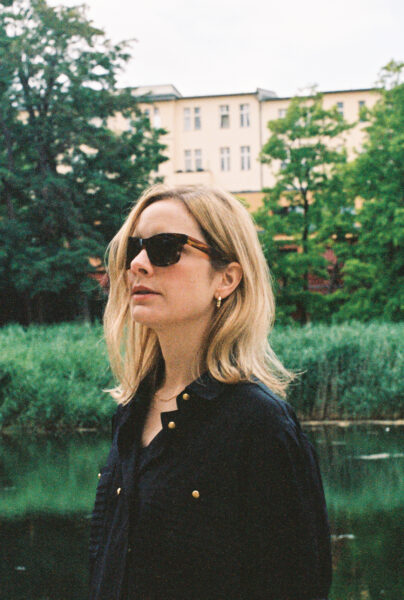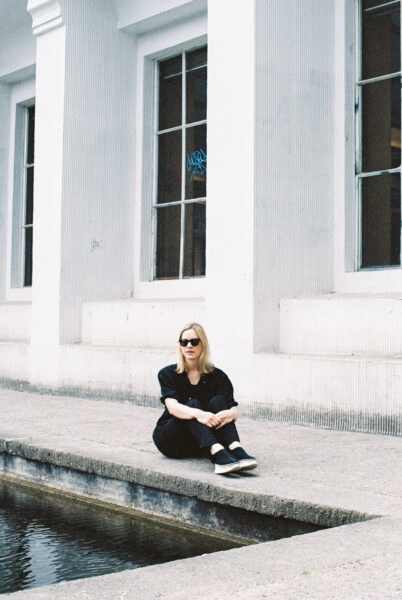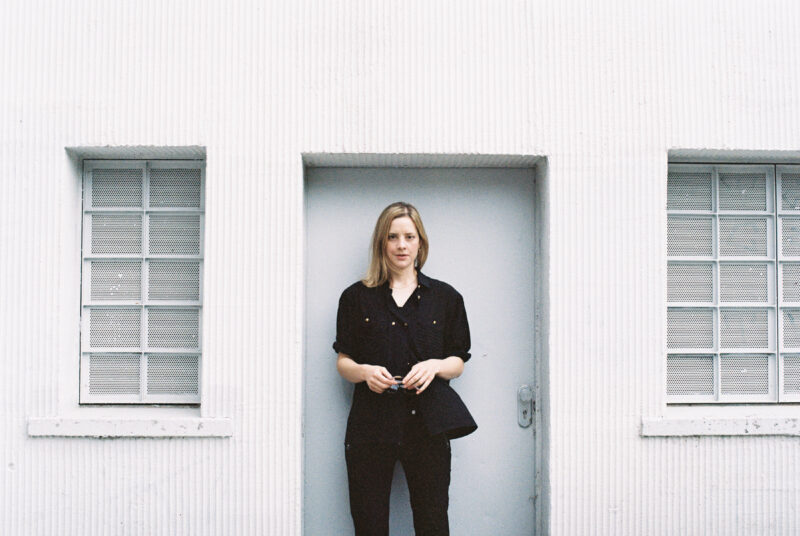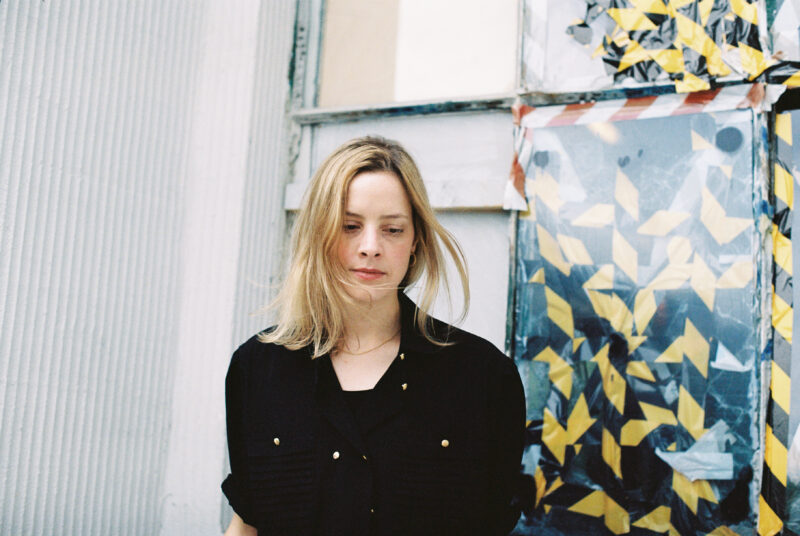Last year, with the pandemic cutting off most traditional promo options, The Strokes took to YouTube to make a little bit of noise around their new album The New Abnormal with a series of videos called ‘5guys talking about things they know nothing about’. The videos were a mix of old clips, chats, and Zoom drag, but the band members also shot the shit about their favourite music, and on episode three drummer Fab Moretti talked about Anika, saying he had seen her live at New York venue Elsewhere, had his mind blown, and had been listening to her music ever since. At that point, it had been seven years since Annika Henderson had actually released any music as Anika (her 2010 debut album Anika was followed up by a 2013 EP, also called Anika – austerity of sound, austerity of titling), but it was a nice illustration of the way her reputation had grown over the years, even occasionally in her absence. Those early records, icy, unsettling electronica made with Portishead supremo Geoff Barrow’s band BEAK, might have met a puzzled reception when they originally came out, but over the years they’ve won more and more fans, and carved out a space for Anika as bold, challenging, and uniquely-memorable artist.
And now she’s finally going to fill that space again. After spending the last few years in shapeshifting, restless experimental band Exploded View, she’s back with a new Anika album. Change is a new record, and in terms of Anika’s sound, a very new one – a page has been turned, and she’s expanded the horizons of what she can do. The dubby overtones and the cut-glass poise in her vocal provide a link to her earlier work, but Change is a record that blooms in many different colours in comparison with her previous, more monochrome sound. It takes the listener on a journey though bright, airy pop music and shivering, tense electronic, and themes that travel from darkness to hope and strength. It’s an album that provokes a lot of thoughts, and gives us a lot to talk about. So I met up with Annika in Berlin to do exactly that.
The last Anika EP came out in 2013, and that was the last official solo release, and in the intervening time you’ve done a lot of stuff with Exploded View, but Anika has been on ice. How did you end up making another solo record?
The thing is, it always continued. I wanted to write the next album before I started each collaboration, but then I ended up falling into each collaboration in order to get to the point that I wanted to get to. Often I felt I didn’t have enough skill yet [to make the thing that I wanted]. And that’s the great thing about collaborating with people, I only ever did it when there was something I could learn from and grow. If it was someone who wanted me to sing like I did on the first album, and where I would have had nothing to do with the music, then I would say no. And there were a lot of collaborations I tried with some really interesting people, who I admire and respect, where it didn’t really work. So that was the cool thing with Exploded View, it was such a great place to learn. [But] with Anika, it was almost like I had to find my own voice again before it could happen again, even though the first one was of course a massive collaboration with BEAK, not just Anika.
Yeah, because with the original stuff, it was with BEAK, the majority of the songs were covers. I guess you didn’t want to just re-activate that formula again?
Yeah, it wouldn’t have made sense. Even with the last one, the intention was never to write an album. I just met Geoff, and we were both pissed off at the industry, and frustrated with the way you had to be, in order to be a recording artist. They were apparently looking for a singer for BEAK, but I had no idea what was going on, I didn’t know who BEAK were, I didn’t know who Geoff was, I was just unemployed and had nothing to do, so I thought ‘well, I can go to the studio and hang out, there’s tea and stuff’. It was a very different process. And then that unexpectedly did quite ok. But [to do that again] didn’t make sense. Why, if you wanted to make an anti-album, would you go and make a copy of it just because it turned out well?

Photo: Liv Toerkell
But if we flash forward past the Exploded View period, and to where you start making what would become this record, you started off working on it alone at [Berlin studio] Klangbild. What kind of ideas were in your head when you started that process?
December 2019 to March 2020, I took off, and I saved money to actually make music. Because I had never actually had focused writing time before. So I said I was going to write the album then. Then my personal life got in the way, and started hijacking me, but I did write a lot of songs. Then my old manager and I fell out, and it felt like the songs were not quite there. And then Corona happened, and everything went to shit, including my personal life, and then suddenly the only thing I had to get through this time was write. So I tried to write a song every day, and I wrote texts every day, just to try and make sense of this situation. I felt like there was gaslighting going on in the real world, and in my personal life too, so the only way I could have a voice was when I wrote it down. The songs were the only thing I had to hold on to. I kept writing stuff, but I couldn’t write at home when recording the album, because there was so much going on there, so I booked this studio, which had the synths I wanted to use, and made a load of beat loops and chord progressions as a starting point. I went in there, and started to figure out some rough ideas, and started freestyling the lyrics. And it was usually stuff that was on my mind that day, and so I finally had a voice, I finally had a space to think. The sound tech, whose studio it was, he didn’t really understand what was going on, because I just came in every day and had a battle with myself, and then went home and said ‘can you send me the recordings’ [laughs]. And that’s how the demos were written.
Always on the move
Talking about the sound of the album, it’s much warmer and more colourful than earlier Anika stuff, which is quite icy. So what sound were you going for when making it?
I think because it was quite a personal album, and I did want it to be a beacon of hope. Kinda about how everything around you is trying to pull you down, but you can get up again. So the sonic choices came into that as well. And with things like wanting to work with Martin [Thulin, producer and Exploded View bandmate], that was a very specific choice, because I know his sound. And I wanted it to have this almost 90s pop sound, and he’s good at that sound. I remember when we first started to work together, that annoyed me about him, because he played guitar in the Anika band, and it was wrong. It sounded too nice somehow. But now I wanted that lightness to come into it, and he got what I wanted to do with it. We co-produced it wholly in the end, it was very much a joint battle. And like I said, I didn’t want to repeat the first one – It would be pretending to be who I was ten years ago, but since then I’ve learned so much, I’ve worked with so many people, I’ve listened to so much music.
One of the things you talked about in the press release, was [Rachel Carson’s environmentalist book] Silent Spring, and this culture that we have of wanting stuff on demand all the time, and how that pushes away all other considerations. You said “So long as we get what we want NOW and on demand, who cares about whether we are taking care of the future”. That’s something that I think about a lot – we are hooked to this convenience culture of Deliveroo, Gorillas, Netflix, and it’s even in our politics. On Change you say “We could do well to listen sometimes, and not shout about things we know nothing about”. It’s just a sort of online screaming entertainment, rather than really thinking about things. So I was wondering, is that sort of set-up we’re currently in, where we we’re told this is the only thing we can have, this cheap convenience culture, with the idea of long-term thinking or consideration out of the picture, is that something that influenced some of the themes on the album?
Yeah, and I feel like we are in this very bite-sized culture, and everything is very fast and throwaway. I think especially with political opinions and stuff. I read a lot, and I did a lot during lockdown.
I don’t really want to watch a series or anything, because it makes me more anxious, and it doesn’t really do anything. But I feel with reading, often it brings me to a new place, and sometimes actually eases some of the anxiety.
It really does engage with your brain on a deeper level than sitting there and munching on some series. So I read a lot of older books, and also new ones, and I try and mix it up a little bit, depending on what things are confusing me in the world, I try and read around things as much as I can. But often people ask me like ‘ooh, you’re reading that’, and it might be some philosophy book, and they ask ‘what’s the main takeaway?’ and I hate this phrase [laughs]. You want me to sum up the main takeaway of a philosophy book, so what, that you don’t need to read it and you can just quote it to other people? You don’t learn things overnight. It’s like English politics, such short-term thinking. You have to work at things, it’s the same with yourself. It’s a long process. But with this consumer culture, it’s very difficult, because my generation and many others, it’s hard. You move a lot, you live in a cheap flat, you’re dispensable, your employer doesn’t care about you, he keeps reminding you about that, you have no rights. And you want at least that your 10m2 flat feels a little bit nice. I mean, I move the whole time, and so I sell stuff on eBay the whole time, cos I’m moving. It’s a weird state to be in, because it makes it hard to build upon stuff.
But how that comes into the album is interesting, as on Change for example. Because the weirdness of that point is that Capitalist Realist perspective – that kind of ‘yeah life is very tough, and no-one is really offering any way to make it better, but try and make the best of it and enjoy the little things you can’. I think the power of a song like Change is that it does dare to be optimistic. Do you think there’s a value in that, to have the courage to be optimistic and to actually look towards the future?

Photo: Liv Toerkell
Yeah, I hope so. I think especially with Change, because it doesn’t say ‘you need to do this and everything will be alright’. It doesn’t necessarily have the answer, but it wants to do something, and I think half the battle is just wanting to do something different. I think often, not having the answer is seen as a sign of weakness. People think that they can take someone down if they admit to not knowing something, and it’s not very constructive, it means that things often don’t change. I think sometimes that it’s important to just make that time and space to think, and say that I’m not ok with the way things are, I do want to change something, and I think it’s possible. We’re in such a speedy society that people are afraid to take the time to figure things out. The idea is there, that if I’m here thinking about things, someone is gonna go and build a massive tower block on top of my house while I’m here thinking about it. But you can’t think like that. I think there are a lot of people in that boat, especially during lockdown, where everyone had to stay at home and all these things were going on and you just had to sit on your hands and read about it in the news. You couldn’t do anything about it. It was the same with the Black Lives Matter movement, and that’s actually what that line is about. That thing about not shouting about things you know nothing about – I do appreciate that I can’t understand what it’s like to be a person of colour. And so from my point of view, I wanted to listen as much as I could.
I think with social media, it’s sometimes expected to have an opinion about everything, or you’re seen as this and this. There are things I do speak out about. But equally, there are things I can’t have a solid, gleaming, polished opinion about, because it’s not my place. There it’s my place to listen, and support other people in speaking up.
Living in weird times
There are a pair of songs at the centre of the album, Sand Witches and Never Coming Back. They are heavier songs, with this queasy musical backdrop, and they struck me as the individual staring in horror at things happening around them, feeling very small. Was that what you were trying to capture?
Yeah, I suppose. I mean, it’s weird with Sand Witches, because it was a total freestyle. I wrote that in the first session with the studio guy, and so at one point he started playing piano, and I had this text that I started reading over the top. And that’s how it started. But then I took it into the second session, took the vocals and then played something else under them, including my weird piano solo, which wasn’t meant to be on there [laughs]. Martin and the other studio guy were in the control room, and so I just started trying out the piano. I think they’re both thoughtful ones. Sand Witches is a lot about England, about where you come from and not being able to recognise it any more. And that could be about family, anything. Looking back at things, and seeing how you’re in such a different place. In England, when Brexit was happening, I just couldn’t understand how it happened in a place that, when I grew up, was reasonably liberal in a lot of ways. Ok, I lived just outside of London, with a very mixed population of Indians, Bangladeshis, Italians, Sicilians. There was racism in its own way, but it was reasonably liberal. But then for Brexit to happen, it was like what was going on? How is this happening? What are people actually voting for? I just didn’t understand. It is weird, when you see people having these weird opinions about stuff, it might be family, it might be someone close to you. It’s been the same with Corona, like when someone might say ‘Oh, well I don’t believe in corona anyway’ and you have to say ‘Oh, really?’. It’s just a weird time.
One of the things that I thought about with your old stuff, was the way the setting and delivery you used with the lyrics gave them this sense of multi-dimensionality. Of course, there were the two songs that were your own originals, No One’s There and Officer Officer, which leaned heavily on that, but even with the pop lyrics, the way you delivered them and set them, opened up these new angles of meaning, they could be taken in multiple different directions. I think a lot of the lyrics on the new album have that kaleidoscopic sense of meaning, you can interpret them in a lot of ways. So I was wondering how you wrote them – you wrote them on the spot a lot of the time?
When I came to the first studio [for Change], I turned up with this box of papers. The tech said ‘Where are your instruments?’ and I said ‘Well, I’ve just got this’. And it was all my diaries and notes, I’ve kept a diary for the last ten years, and I write lyrics and notes in there. So that comes in where I do the freestyling, where I hear the song and then I go and look for the words. It’s like the cut and paste technique, but using yourself. You’re working with your past self. So I might totally reinterpret stuff, maybe I wrote originally about something else, but today I will take it and put it this way, and I add new stuff and work it out.
When you’re in the right place, it just happens. There has to be this environment, where no-one is watching you, no-one is waiting for you, and then you’re on the train. But when I knew I was going to write this album, I started writing every day, because it’s like stretching for a race. Then things come quicker, and you get used to formulating your feelings again, and things flow somehow.
So let’s go to Wait For Something. It’s the last song on the record, it starts off with this pretty acoustic guitar, and then it blooms into this floating, spacey rock song. It doesn’t sound much like anything you’ve ever made before, with Anika or Exploded View. It feels like a very sweet note to end the record on, even though it’s a bit ambiguous. So what was your thinking in placing it at the end?
It’s a very weird one, and it’s so unashamedly cheesy, gross almost. It was from this batch of demos where I wrote a lot on the guitar. I was in this weird place, I had a few of the wrong people around me at the time, and I didn’t really know how to get out of it. We used the real demo in the final song, I think because I wanted to keep it in, because at the time I made the demo, there were a lot of people telling me I had no chance, that I couldn’t do this or this, blah blah blah. A lot of idiots. So I wanted to put it in as a little flag, like ‘Hah!’. For the song, Martin came to Brandenburg, and we were figuring stuff out. With this one, he added the strings on the end, and I don’t know where I was when he did that, I must have popped off for a second. So he just said ‘I tried this, what do you reckon?’ So that was one where he wrote a whole bit of how it went. And it’s cool with this song. No one ever understood any of the demos I made, not even Geoff, who said ‘Well, I don’t really get this, but you know, you’ve always got a home at Invada’. I was like ‘Wow, thanks!’ [laughs]. But with this one, Martin was like ‘No, I can see where you’re going with this’. So it ended up the way it went, and it was so cheesy, but Martin was listening and got it. And it came at a point where it seemed like the album was never going to end, so it represents that little bit of light. But it’s so cheesy. I’ve been playing it live with the new band, and I’m just embarrassed! But it was important to put it there. It’s just a very vulnerable song I suppose, and that’s always that way. It’s about overcoming in a way, because there were a lot of people around who were trying to destroy me, and I didn’t let it happen. Let’s just hope that it doesn’t get bought by a phone advert.

Photo: Liv Toerkell
Change is out now on Invada/ Sacred Bones.



